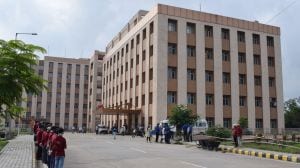Brackish water in canals raises concerns in Punjab’s Abohar, Fazilka and Muktsar districts
Farmers in the Malwa region have frequently complained about industrial and sewage discharge from cities like Ludhiana polluting the Sutlej, which supplies water to Harike Headworks and to various canals.
 The region heavily relies on canal water since the sub-surface water is unfit for drinking.
The region heavily relies on canal water since the sub-surface water is unfit for drinking.Brackish canal water has become a major concern in Punjab’s Abohar, Fazilka, and Muktsar districts. The Abohar Branch Canal, which originates from the Ferozepur feeder at the Harike headworks, carries water to Fazilka, supplying numerous villages through its distributaries. Water reaching Muktsar through various distributaries is also brackish, raising alarm among farmers and other residents.
The region heavily relies on canal water since the sub-surface water is unfit for drinking. Abohar MLA Sandeep Jakhar, speaking to The Indian Express, said, “Our area depends entirely on canal water. Although the wheat crop does not require water at this stage, we need it for drinking purposes. However, for the past four-five days, brackish water has been flowing in the canal, making it unsuitable for storage in overhead tanks at waterworks, which supply filtered water to households.”
Farmers have also raised concerns over the impact on agriculture. Darshan Singh Giddranwali, a farmer from Giddranwali village, said, “Kinnow orchards are receiving only this contaminated water. As for drinking, it is completely unusable.”
Sukhjinder Singh Rajan, a farmer from Abohar, criticised the authorities. “The canal was shut for cleaning in February, and water was released in mid-March. But for the past few days, the water has been discoloured and foul-smelling. Authorities seem indifferent to this issue. Polluted water keeps entering the canals repeatedly, yet the government has made no serious efforts to resolve this problem. Safe drinking water is a fundamental right of every citizen,” he said.
Gurpreet Singh from Patti Sadik village in Abohar said, “Contaminated water comes off and on in our canals and canal department takes it for granted by saying that quality will improve in a few days. When CM Bhagwant Mann was in the Opposition, he was very concerned about this issue but things haven’t improved till now.”
When contacted, Vinod Suthar, Executive Engineer of the Abohar Canal Department, said, “Yes, discoloured water was observed in the canal on Saturday. I have coordinated with Harike Headworks, and clean water is now being released. It should reach Abohar and surrounding areas within two-three days.”
Suthar explained that sometimes stagnant water stored at one end of the headworks gets released, causing discolouration. However, asked about potential industrial effluent contamination, he said, “We are not certain if industrial waste has mixed into the water, but we cannot completely rule out this possibility.”
The issue of industrial and sewage waste mixing into Punjab’s waterbodies has been a long-standing concern. Farmers in the Malwa region have frequently complained about industrial and sewage discharge from cities like Ludhiana polluting the Sutlej, which supplies water to Harike Headworks and, subsequently, to various canals. The Buddha nallah in Ludhiana has been a major source of pollution, though efforts are underway to rejuvenate it by Rajya Sabha member and environmentalist Balbir Singh Seechewal.
Breach in Sukhchain Minor Canal
A breach occurred in the Sukhchain minor canal on Friday night near Khairpura village in Abohar, causing severe flooding. The breach, estimated to be 80-100 ft wide, has occurred twice at the same location within 15 days. Though the breach was plugged on Saturday, water flooded over 100 acres of wheat fields that were nearing harvest.
“Now, farmers will have to wait longer to harvest their crops,” said Rajan, the farmer from Abohar.












